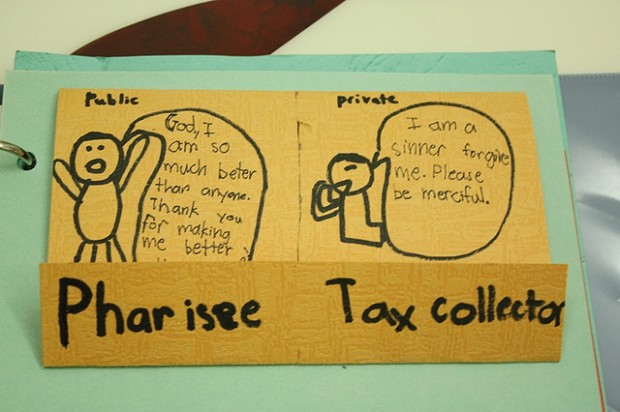He also told this parable to some who trusted in themselves that they were righteous, and treated others with contempt: “Two men went up into the temple to pray, one a Pharisee and the other a tax collector. The Pharisee, standing by himself, prayed thus: ‘God, I thank you that I am not like other men, extortioners, unjust, adulterers, or even like this tax collector. I fast twice a week; I give tithes of all that I get.’ But the tax collector, standing far off, would not even lift up his eyes to heaven, but beat his breast, saying, ‘God, be merciful to me, a sinner!’ I tell you, this man went down to his house justified, rather than the other. For everyone who exalts himself will be humbled, but the one who humbles himself will be exalted.” Luke 18:9-14
Did you notice all of the first person pronouns in the Pharisee’s prayer? I… I… I… I… I… There’s not one mention of what God has done. There’s no mention of grace. All that the Pharisee seems to be consumed with is his righteousness and the sin of others. I think we all like to think of ourselves as the tax collector in this story. He’s the good guy. That’s probably how we always read the Bible. Too often we identify with the hero of the story. We probably do that because it makes us feel good about ourselves. And therein lies the problem: we are focused on us. We are focused on “I.”
As much as we may hate to admit it, we don’t play the role of the tax collector as often as we do the role of the self-righteous Pharisee. Sorry if that bothers you, but I’m just telling it like it is!
Jerry Bridges says, “The problem with self righteousness is that it seems almost impossible to recognize in ourselves. We will own up to almost any other sin, but not the sin of self-righteousness. When we have this attitude, though, we deprive ourselves of the joy of living in the grace of God. Because, you see, grace is only for sinners. After love and humility, there are at least twenty-five more Christian virtues to put on, among which there is surely a lot of room for all of us to grow. Yet to the extent that we miss the mark in those positive Christian character traits, we are sinners in need of God’s grace.”~ The Discipline of Grace: God’s Role and Our Role in the Pursuit of Holiness
So now that I’ve convinced you that you are probably more like the self-righteous Pharisee, let me remind you that Jesus still loves you. He knows that it’s easy for you and I to point out the sins and flaws and weaknesses of others while highlighting our own “righteousness.” And guess what? He still loves you. He still loves me. So instead of focusing on what others have failed to do or on what you “seem” to do better than others, focus on Jesus. Focus on Jesus because he loves humble sinners. Remember, grace is only for sinners. And that’s what you are! I know that might sting a little, but I wouldn’t be a good pastor (or blogger) if I didn’t tell you that you are one.
A sinner just like you,
Benji

